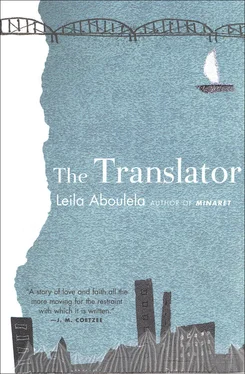Rae sat with Amelia as she sunbathed by the pool. Bikini from Paris. The setting had a colonial air about it, in the Arab waiters spotless in their white uniforms, in the cocktails served by the pool. Leaves fell into the water and a wretched-looking man with rolled up trousers, inferior in status to the waiters, removed the leaves with a long net. The man, the waiters and Rae were the only ones who were fully dressed. Rae wore khaki-green. Khaki-green and khaki-brown were his favourite colours, his image.
In the presence of Amelia, Rae was dizzy from the sun, the perfect blue of the pool. A clear thought wound its way through his brain, he told Amelia about it. She narrowed her eyes, hazel eyes with green. The waiters. The thought was about the waiters. Their women were covered, seldom glimpsed, while they earned their living serving iced lemonade to pool-side beauties. In the evening they mixed cocktails, sliced lemons for the water-coloured gin, poured whisky, when alcohol was forbidden to them. That was why, Rae said to Amelia, they had shifty eyes, pathetic giggles, why they went home everyday and beat their children up.
Part of Amelia’s charm was her parents muted disapproval of him. In an evening party by that same pool, a band played ‘Nights in White Satin’, and Rae danced with Amelia while her parents patiently glowered. He was in love, abroad, and she was half-Spanish, exotic. He had come all the way from Edinburgh especially for this. And why did Amelia love Rae? Because he spoke about strange things, because of smoking the hubble-bubble pipe. There was something Arab about this young Scottish man. Something Arab that Amelia had wanted for years. For she had grown up in the splendid villa of her parents, secretly and guiltily eyeing the house-boys, fancying the gardener from Fez.
Rae and Amelia provided the international community with the spiciest piece of gossip of the year. In coffee parties, over telephones, even the men at work spoke of the sudden marriage, the foolish girl. The foolish girl became a sickly wife. Rae pondered morning sickness and could not make sense of it. He held Amelia’s hair away from her face as she vomited time and time again into the bathroom sink. Money worried Rae. His brain thought money, money, his heart hurt. He sat up late making calculations, adding and subtracting figures on smudged bits of paper. He got into debt and began to have nightmares about Moroccan prisons. The job at the shop had been adequate for him before, but not now. And what of him, his career. He had vague ideas of becoming a political analyst, a foreign journalist like the ones he met at the shop, travelling the world in search of war and revolution.
Amelia did not take to the presence of the pilots in the flat. ‘They smell,’ she said and sobbed on Rae’s shoulders. One evening her mother came and there was a scene, her mother shouting at Rae in Spanish.
In her sickness, Amelia could eat nothing but what her mother cooked. She left the flat days at a time to be looked after in her parents’ villa. Rae skulked around in the cafés and in the mosques. His pilot friends assured him he had done the honourable thing. He did not feel honourable, he felt he had messed up his life or that fate had messed up his life. But it was with good nature that he made cocoa for Amelia, tried to make her smile. He was comfortable with domesticity, the feeling of not being alone, sharing the mundane, a bar of soap, the dust that crept into the room.
They did not talk much about the baby. He came into the world with difficulty, a little blue, with no chin, strange-shaped eyes like crescents, a crooked spine. Amelia was not allowed to see him. She never did. Rae never forgot the weightless, mangled bundle, the hair that was thick and dark, the colour of his own hair. He had always thought that babies were born bald, he had not expected so much hair. The hair made him cry in front of Amelia’s parents, the doctor and the nurse.
Grief pierced the continuity of his life, for a while burned away even the desire for the World Service. While Amelia recuperated in hospital, he sought, red-eyed, his pilot friends. Their company cooled him. They spoke to him but he could not listen, understand, was content with their voices alone. The things they said. That children who die will intercede for their parents. They will stand at the gates of Paradise and refuse to go in without their mother and father, cry out wanting them, and Allah will grant them their wish.
In the hospital Amelia suffered from the shots they gave her to dry up her milk, from the stitches, from the feeling that all that pain was for nothing. She grieved for the figure she once had, for the happy life of swimming and parties. She blamed Rae, the physically unscathed Rae. Her mother blamed Rae. Everything about him was wrong. Her pretty daughter could have done much better than that. Much, much better. But it was not too late, reasoned the shrewd mother, in fact what had happened to the baby might not be such a bad thing after all. If she acted decisively she could put an end to this silly marriage. She enlisted the help of Rae’s employer. The wise scholar pondered and puffed at his pipe. He advised Rae to give up, to leave, to go home and continue with his studies. And Amelia said, ‘I don’t want you anymore.’
In the years to come, fate for Amelia twisted and held out a Welshman, a bungalow in Gwenyd, daughters and sons. She became an excellent cook like her mother and eventually ran her own catering business. Rae went back to student life, abandoned the plans to become a foreign journalist. Perhaps he had come to discover that under their wordly exterior was a narrowness, a lack of empathy for Morocco. He was too heavy for their globe-trotting world, too deep. It was the ideas and the words that he loved. Marxist, strategic. Guerrilla warfare, resistance. Nationalism. Revolution. Coup d’état.

Sammar sat with her head on her knees. She thought of that silent baby, a European buried in African sand. She said on the telephone, ‘How can you like a place, visit it again, study its culture and history when something horrible happened to you there?’
He was quiet.
When he spoke, he said, ‘Because it was healthy for me, like medicine. It made me less hard. And I learnt things I could not have learnt from books. Like you.’
She did not understand. ‘What, about me?’ she asked. And again he said, ‘You make me feel safe. I feel safe with you.’
Sammar walked to work wearing her new coat, conscious of how clean it was, how the wool was not faded or worn out. In the shop windows, she saw her reflection, the coat’s henna-red colour, the toggles instead of buttons. She felt like when she was young on the first day of the Eid, new dress, new socks, a new ribbon for her hair. At the pelican crossing when she was waiting for the lights to change, she took off her glove and put her hand in her pocket to feel the fresh silkiness of the lining. Green man, the sound of an alarm clock, and she crossed the road, putting her glove back on. It was too cold for bare fingers, January cold, even though the day was mild for this time of year and she had decided to walk instead of taking the bus as she usually did. A still day with a downcast sky, no sun. She had learnt early on, from the first year she had come with Tarig, that the winter sun of this city was colder than its winter rains. Many times before that lesson was learnt, she had seen the bright sun from the window, felt its warmth through the glass and gone out lightly dressed, only to shiver with incomprehension and suffer as every inadequately dressed African suffers in the alien British cold.
Читать дальше













